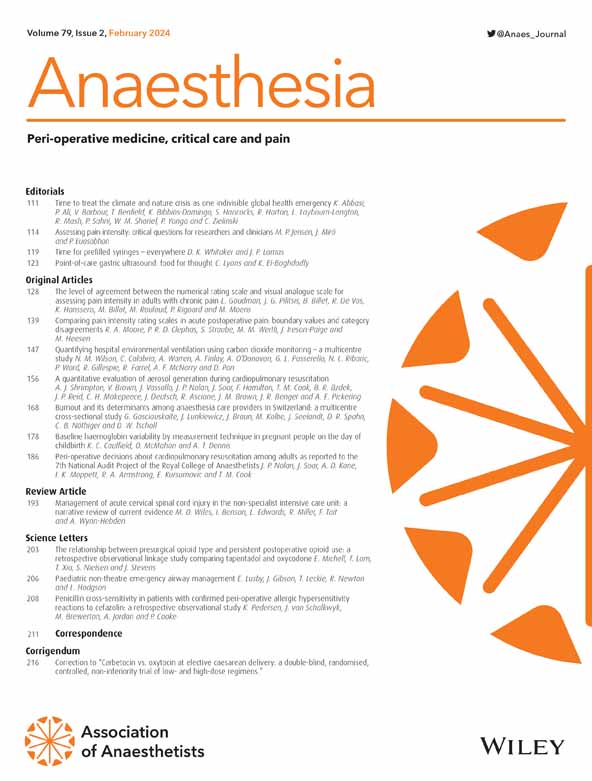区域麻醉超声扫描人工智能技术评估报告指南(GRAITE-USRA):国际多学科共识报告框架。
IF 6.9
1区 医学
Q1 ANESTHESIOLOGY
引用次数: 0
摘要
应用人工智能来增强超声引导区域麻醉的临床实践越来越受到临床医生、研究人员和工业界的关注。这一领域的研究缺乏标准化报告,妨碍了研究结果的可比性、可重复性和综合。我们的目的是制定一个基于共识的报告指南,以评估人工智能在区域麻醉超声扫描中的应用。方法我们采用赤道网络建议的方法制定报告准则。对已发表文献的审查和专家咨询产生了候选报告项目的初步清单。随后开展了一项国际、多学科、改进的德尔菲过程,涉及临床实践、学术界和工业界的专家。进行了两轮专家咨询,参与者对每个项目进行评估,以便纳入最终报告指南,然后进行在线讨论。结果共有67名专家参加了第一轮德尔菲会议,63名专家参加了第二轮德尔菲会议,25名专家参加了圆桌共识会议。grite - usra报告指南包括40个项目,涉及区域麻醉超声扫描人工智能研究报告的关键方面。具体项目包括超声采集协议和操作员专业知识,这些在现有的人工智能报告指南中没有涵盖。grite - usra报告指南为区域麻醉中超声扫描的人工智能相关研究提供了一套最低限度的建议。它的采用将促进一致的报告标准,提高透明度,提高研究的可重复性,并最终支持有效地将证据整合到临床实践中。本文章由计算机程序翻译,如有差异,请以英文原文为准。
Guidance for reporting artificial intelligence technology evaluations for ultrasound scanning in regional anaesthesia (GRAITE-USRA): an international multidisciplinary consensus reporting framework.
INTRODUCTION
The application of artificial intelligence to enhance the clinical practice of ultrasound-guided regional anaesthesia is of increasing interest to clinicians, researchers and industry. The lack of standardised reporting for studies in this field hinders the comparability, reproducibility and integration of findings. We aimed to develop a consensus-based reporting guideline for research evaluating artificial intelligence applications for ultrasound scanning in regional anaesthesia.
METHODS
We followed methodology recommended by the EQUATOR Network for the development of reporting guidelines. Review of published literature and expert consultation generated a preliminary list of candidate reporting items. An international, multidisciplinary, modified Delphi process was then undertaken, involving experts from clinical practice, academia and industry. Two rounds of expert consultation were conducted, in which participants evaluated each item for inclusion in a final reporting guideline, followed by an online discussion.
RESULTS
A total of 67 experts participated in the first Delphi round, 63 in the second round and 25 in the roundtable consensus meeting. The GRAITE-USRA reporting guideline comprises 40 items addressing key aspects of reporting in artificial intelligence research for ultrasound scanning in regional anaesthesia. Specific items include ultrasound acquisition protocols and operator expertise, which are not covered in existing artificial intelligence reporting guidelines.
DISCUSSION
The GRAITE-USRA reporting guideline provides a minimum set of recommendations for artificial intelligence-related research for ultrasound scanning in regional anaesthesia. Its adoption will promote consistent reporting standards, enhance transparency, improve study reproducibility and ultimately support the effective integration of evidence into clinical practice.
求助全文
通过发布文献求助,成功后即可免费获取论文全文。
去求助
来源期刊

Anaesthesia
医学-麻醉学
CiteScore
21.20
自引率
9.30%
发文量
300
审稿时长
6 months
期刊介绍:
The official journal of the Association of Anaesthetists is Anaesthesia. It is a comprehensive international publication that covers a wide range of topics. The journal focuses on general and regional anaesthesia, as well as intensive care and pain therapy. It includes original articles that have undergone peer review, covering all aspects of these fields, including research on equipment.
 求助内容:
求助内容: 应助结果提醒方式:
应助结果提醒方式:


